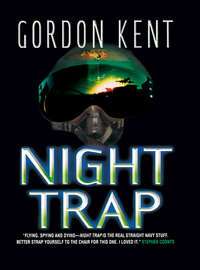
Полная версия
Hostile Contact
“That it’s a case that nobody’s solved in nine years. Your big chance, Mike.”
Dukas sighed. “I was hoping I’d get something I could, you know, at least use to tie Suter to the Shreed investigation.” He threw down the red folder and opened the green one. “Oh, ow,” he said. “Ow, ouch, oh, shit—radio interference reports up the wazoo! Ouch. ‘Frequency Analysis Tables 1.1 through 1.17.’ Oh, shit.” He sighed. His right index finger ran down the page and he muttered, “Radio, radio…interview, interview, interview—” He looked through the wall of crates at the stacks of folders and growled, “They’ve dicked me.”
And Alan said, “What’s that?”
He had reached over Dukas’s shoulder and turned up the next page so he could read ahead.
“What’s what?”
Alan turned the page all the way over. “‘Communications Plan, Jakarta, Indonesia.’”
Dukas looked at the entry. “Jakarta, Jesus. That’s a long way from northwestern North America.”
“Kind of jumps out at you, doesn’t it.”
Dukas wrote the ID number down on another Post-it and went around the wall of plastic crates and started going through the folders once again. He came back with a slender folder in a white cover with “Top Secret” and “Eyes Only” and “Eurydice” on the front. “You’re not supposed to see this,” he said.
“What’s Eurydice?”
“It’s a classification group, which you’re not supposed to know about, so don’t ask.” He sat down again and opened the folder.
“Holy shit,” Alan said. “It is a comm plan for Jakarta.” He looked over his shoulder. “What’s Jakarta got to do with the northwest?”
“More to the point, what’s it got to do with Ray Suter?” Dukas wrinkled his nose. “I smell an analyst at work.” He opened the folder on his desk, pressing the fold with the flat of his right hand and wincing because the effort hurt his chest. He pointed at the folder, which, opened, had papers attached to both inner sides by long, pointed prongs through holes in the paper. “Right side,” he said, “meat and potatoes. Left side, the analyst’s brilliant synthesis of materials.” The comm plan was on the right side. On the left, on top, was a sheet that said simply, “No action recommended.” Below it were several sheets with long numbers at the top. On the top sheet, however, a different hand had written in pencil, “Follow this up—S?”
“Suter’s writing?” Alan said.
“Beats me; I don’t even have a sample of that. ‘Follow this up—S, question mark.’ S for Suter? S for Shreed? S for shit?” He made a farting noise with his lips and tongue.
“Yeah, but Mike, at least Suter had it. So why did Suter have it? You say he was into Shreed’s business—what was he looking for? Maybe this is something you can run with, after all.” Alan began to turn the pages of the analyst’s report. “Doesn’t seem to be all there,” he said.
“It wouldn’t be. The number’s a high one, meaning that this is part of something else. ‘Observation of courier contact site.’ See, this is what caught the analyst’s eye—actually, probably an abstract someplace. Yeah—here on the second page, see—‘The courier is believed to have visited the US, with special relevance for naval facilities in California and the Pacific northwest.’ Aha, says the analyst, that might have a connection—notice the ‘might’; the woman—it’s usually a woman—is reaching; she’s desperate. She gets a copy of the relevant stuff and smacks it into a folder and here it is.”
“Who wrote the report?”
“Who knows? Some agent doing his job; he’s busted a comm plan, written it up, turned it over to his case officer, and here it is.” He tapped the comm plan’s several pages of narrative.
Alan reached over and turned the pages on the left side, reading quickly, then did the same on the right. The paper was slightly brittle, the comm plan itself old enough to have been done on an electric typewriter rather than a computer printer. He lifted the top page on the left again and said, “1993.”
“A little long in the tooth,” Dukas said.
“But they never checked it out.”
Dukas stretched. “So?”
Alan cocked his head. “Well, somebody, maybe Suter, thought it was worth following up.” His old grin, not seen for a month, partly returned. “Doing something is better than doing nothing—right?”
Dukas shook his head. “You’re having an idea. I don’t like that.”
“I just thought somebody could go to Jakarta, check it out—follow it up, like it says here—” He looked like a kid asking for the day off from school.
Jakarta.
Jerry Piat moved his practiced hand from the bargirl’s neck, over her breasts, down her flat and naked stomach, his hand always light and playful, never heavy or commanding. He hooked a leg under both of hers and rolled them both over so that she was above him, her breasts heavy against him, her long hair a black cloud that smothered him in incense. At least, it smelled like incense.
He watched her with the detached part of his brain, the part that wouldn’t ever turn off, not when he was fucking, not when he was getting shot at, and that part registered that she was fourteen years old and had a “Hello Kitty” bag for her makeup. She liked him.
The phone rang. His hand found it, lifted it from the receiver and dropped it back to the cradle. She laughed, happy that she was more important than a Bule (Westerner’s) business call, but Jerry was just following the signal procedure—his agent, Bobby Li, would give him one ring, and then he would go out to a pay phone to talk. It wasn’t exactly Moscow rules, but it was tradecraft, and Jerry was alive and sane where a lot of his peers were either dead or content to run Chinese double agents and lie about their access. Jerry rolled them both over again, still agile at fifty, and kissed her, hard, on the lips, which clearly surprised her.
Her body was still very much on his mind when he cursed the lift and started down the seven flights of cockroach-infested stairs to the hotel’s lobby. The lobby was clean and neat, but the stairwell’s strong suggestion of urine stayed in his nostrils until the heavy petroleum scent of unleaded car exhaust drove it out as he stepped into the street, still pulling a light jacket over his old silk shirt. The jacket had only one purpose, to hide the bulk of the gun that sat in his shoulder rig. In Jakarta, the only men in jackets were wearing guns, or so Jerry had come to believe during Suharto’s regime. The place looked better now, cleaner, richer, even after the collapse in the nineties.
He stopped on the street, lit a cigarette from a nifty gas lighter with a serious torchlight that he had picked up at the airport. You could solder with the damn thing, and that could have its uses. Or you could burn someone’s eyes out.
Two cab rides and three bars later, he was getting ready to make his phone call, on his way to start the process by which he would kill the men who had killed George Shreed.
One more stop, he told himself. For old time’s sake.
And, of course, for caution’s sake, because there always just might be that watcher who needed to be convinced that he was bar-crawling and not running an op.
Suburban Virginia.
Alan greeted his wife at the door with a kiss and a suddenly urgent embrace. She leaned back in his arms and looked at his eyes and saw something that made her grab him and squeeze him hard. They stood there, holding each other, rocking, and she said, “Something good happened, right?”
He laughed, a sound she hadn’t heard in a while, and he said, “I went to Mike’s office to do some work. He got a new case—it’s interesting, there’s something in it for me, maybe.”
She was still in her flight suit. She had been out at Pax River, putting in her hours in the T-84 as she transited from choppers to fixed-wing. Holding her, seeing the sudden brightness in her eyes, he understood her misery of the past two weeks, never knowing what she would come home to. “I’m so sorry,” he said.
“No, no—”
“Yes, yes.” The dog pushed between them then and they both laughed and he pulled her into the house. “I had to leave Dukas early to get Mikey at school; no problem, but Dukas has this case, this crate of stuff! A case, something they dumped on him from the Agency because they can’t hack it but I think we can; there’s this comm plan in it; it doesn’t make sense, but—I’m babbling, right?”
She laughed. “Right.” She kissed him. “Keep babbling; it’s nice.”
“I’m getting dinner.”
“I smell it. Risotto with white beans, garlic bread, frozen peas, and a salad, right?”
“I invited Mike for dinner.”
That took a beat for her to absorb, sobering her, and she smiled too brightly and said, “Great!”
“To talk about the case,” he said.
“Great!” She headed for the stairs. “I’ll just change into something glamorous.”
Half an hour later, Dukas was there with an attaché and a cell phone, which he dumped on the battered coffee table. He kissed Rose. “Hey, Gorgeous, you’re breathtaking.”
“Did you bring the comm plan?” Alan shouted from the kitchen.
“Like you asked, yes, yes, yes! I always do what I’m told.” He glanced toward the kitchen and lowered his voice still further. “This okay with you, babe?”
“If it makes him this cheerful, God, yes!”
“He’s a little manic,” Dukas murmured.
“I’ll take manic,” she said. “He’s so down when he’s not in things.”
Dukas looked toward the kitchen again. “I used to think it was just, you know, type A behavior. But now I realize he always has to be proving something. To himself.” He lowered himself into an upholstered chair. “You know the difference between you two? You’ve got a plan, an ambition—you’re going to be an astronaut. You’ve built a career around it. He doesn’t have a plan. He just has to—go.” Dukas looked up at her. “What’s the matter with him?”
Alan shouted from the kitchen, “You talking about me out there?” He appeared in the doorway, grinning. “Speak up, or I’ll think you’re analyzing me.” They stared at him a little guiltily, and the dog got up and sat there looking at him, too, and they all began to laugh.
Jakarta.
“Hey, Meester?” the voice said. Jerry whirled; that hand was awfully close to his pistol.
“Back off, bud.” Jerry glared at the boy, but the boy, half Jerry’s size and weight, held his ground.
“You memba?” He pointed up at a large sign in Dutch and English, Dutch still first, because this place went way back. ANHANGER ENKEL, MEMBERS ONLY.
“I was a member here when your mom still worked here, bud.” Jerry leaned forward. “Asrama pekerja?”
Malay was clearly not his mother tongue, but the boy smiled and nodded.
“Go get the missus, then, bud.” Jerry waved his hand, palm down, the fingers snapping open, like the locals—dismissed, the gesture meant. Then he turned and walked to the huge teak bar, forty-five feet long and carved from a single tree. He waved to the bartender, a slight youth in a clean white shirt. There weren’t many customers, at least in the bar; the rooms upstairs could be full to bursting and you’d never know. George Shreed had waited for him in the spy’s seat, there next to the alcove, a private booth invisible from the door.
“Meester?” It was the boy from the alcove.
“Hey, bud, we’re done, you and me.”
“You memba?” The boy was insistent, and it reminded Jerry of all the time and money he had spent here. He deserved better.
“Go get the missus. You hear me, sport? The missus? Before I bop you one, okay?” He wondered if they had gone to membership cards. Had it really been so long since he was here? Maybe they had fucking plastic IDs with your photo. He felt someone enter silently behind him, back by the alcove, and he turned to see Hilda, the handsomest of the western blondes of his own day, coming through the door in sensible business attire—not what she’d worn back then, but still attractive.
“Jerry, darling.”
“Hilda. Aren’t you still too young to be trusted with the keys?”
She laughed; she had natural lines at her eyes and mouth that meant she’d disdained surgery, but she looked good. Really good. “This man is a member. An old member who gets anything he wants, mengerti?”
“Yaas, majikan.”
“Drink with me?”
“I can’t—I’m working.”
He looked at her and winked. “You were too good for that sort of thing when we were twenty years younger. The missus never made you oblige the customers.”
“But I’m the missus, now, and I have books to do. Come back—come back tomorrow and I’ll drink with you.”
“I might have to do that, Hilda.” He smiled, gulped the rest of his gin and tonic, disappointed at one level, happy to be on with the job at another.
Jerry gave her something like a salute. She had poise, like a runway model; maybe she had been a runway model before she crashed in Jakarta. He didn’t really know her, but he liked that she remembered him. Whores and spies; the oldest profession and the next oldest, or so the joke ran. He stopped in the alcove, still smiling because she had remembered him.
Aboard USS Thomas Jefferson.
Rafe Rafehausen pulled a stack of paper toward him, read again the paper on top, and then said, “Get me Admiral Pilchard at LantFleet. What the hell time is it there—? Yeah, you might catch him—try, try.” He took the next paper off the stack and started to read, rubbing his eyes and wondering if they’d last through the reams of reading on this cruise, thinking, Jesus, next I’ll need glasses, acutely aware again that his squadron years were over. He tried to concentrate on VF-105’s morale self-study and was relieved when a phone was shoved toward him and the lieutenant-commander said, “Admiral Pilchard.”
Rafehausen threw himself back in the chair. “Sir! Captain Rafehausen, CAG on the—Yes, sir.” He grinned. “Nice of you to remember. Unh, kind of a personal matter, sir. If I say the name ‘Al Craik,’ will you—? Yes, sir, that’s the one.” He nodded his head as he listened. Pilchard was Craik’s self-appointed “sea daddy,” a kind of naval mentor and enabler. He swung, Rafe knew, between thinking that Craik was God’s little crackerjack prize and that he was a dangerously loose cannon, but he’d concern himself with Craik’s welfare if it was threatened. Right now, he was in the loose-cannon phase, and Rafehausen winced at the admiral’s sour tone. When the admiral had finished reviewing Craik’s recent performance, Rafehausen said, “He’s going nuts onshore and he needs something. I can’t take him back here yet—med officers won’t allow it. If there’s something he could do—”
He looked up at the lieutenant-commander, winked as the admiral did some more talking about times in the past he’d gone out on a limb for Craik, and how sick he was of having Craik blue-sky things and act as if rules didn’t exist. When the admiral stopped talking, Rafehausen said, “Absolutely, sir!” He grinned again. “What I was thinking, I just received some correspondence about this experimental MARI det that was set up—that’s the det that Craik was commanding, sir, when—good, yes, sir, you remember all that. Well, it’s gone so well that there’s a request about setting up a second MARI det on the west coast; I was wondering if maybe that could be moved up some, then Craik could go out there now instead of at the end of this cruise—Yes, sir, to advise and—No, sir, not as det CO, and not to fly because—Yes, sir. No, sir. Purely advisory, yes, sir, of course they’d pull personnel from the west coast squadrons, and Craik would—Yeah, Miramar, I’m sure that Miramar—Uh—”
Rafehausen signaled to the lieutenant-commander to close the door. Swiveling around, he bent forward as if he had to talk to the floor. “It’s a matter of helping a good man, sir. I know Craik—I think we could lose him if he doesn’t get something to do. Between you and me, Admiral, I think he got hit harder than we thought on that recent mission. I don’t normally put much stock in ‘trauma’ and all that psychobabble, but he’s been sending me p-comms that, well, I think maybe he’s lost some faith in himself.” Again, he listened, slowly leaning back, and when there was silence on the other end, he said, “Yes, sir. That’d be great. That’d really be great. And absolutely, yes, I’ll put the fear of God in him to do it by the book. And if they can see their way to setting up a west coast det with him on board, it would—Of course, of course, these things take time—Yes, sir. Yes, sir. Yes, sir.”
A minute later, he had hung up and turned back to the pile of paper, Al Craik now only one of many worries nibbling at the edges of his consciousness.
Jakarta.
He gave terse orders to the third cab of the night, cutting across the city, going twice down gangs rinsed clean by the heavy rain, until he was tired of the game. Clean as clean could be. Then he led them back south away from the sea by the toll road, off the Semaggi Interchange and into the gleaming modernity at the heart of Westernized Jakarta. It wasn’t his favorite part of the city; he liked the Japanese in Japan but hated them when they were abroad. It never occurred to him that they acted just like him.
“Wat ingang?” asked the driver in Dutch. Jerry was white and coming from Emmy-Lu’s, hence Dutch, as far as the driver could tell.
“Hotel Mulia Senayan, danke. Simpruk.” The Mulia was the newest, flashiest hotel in Jakarta, with over a thousand rooms and the largest ballroom in Asia. It was the multiple entrances and table phones that drew Jerry—a postman’s paradise. Simpruk was a broad and well-traveled avenue full of business traffic; he’d leave by the main entrance and go to the cabstand, and while he sat and talked he’d be another business traveler. A little seedy, but hardly the only Westerner in the lobby, and that’s what mattered to Jerry. And nice public lines—murder to monitor, and businessmen don’t like monitored lines.
Jerry paid the cab before they stopped, was out and up the steps before the cab had pulled away. No time to linger; this was the operational act itself, the very heart of the game. It didn’t matter if no one was watching; Jerry played for an invisible audience of fellow professionals he hoped weren’t ever there, breezing into the enormous lobby, walking past the desks to the central bar, where leather couches held the open space against a jungle of local potted plants. At each end of every couch sat a house phone, and Jerry knew how to use one to get an outside line in Jakarta. He ordered a gin and tonic from a waiter, sat, and looked at his watch.
Two hours and ten minutes since the phone had rung in his room and he had hung it up. The last time he had worked in Jakarta, he’d been following orders from George Shreed. Now he would set up an operation to avenge him. It had an Asian air to it, like an episode in the tale of the Forty-Seven Ronin.
He lifted the phone.
Suburban Virginia.
“Sleeping Dog was an NSA case, and then it was a Bureau case, and then it was a CIA case. And now it’s our case,” Dukas explained to Rose. They were eating in what was called the dining room, which barely had enough room for the table and three people. “Believe it or not, it’s nine years old.”
“And it’s got this comm plan,” Alan said. “The first action item.”
“Who says it’s an action item?” Dukas said.
“Well, isn’t it? They should have moved on it when they got it, and they didn’t.”
Dukas raised his eyebrows. “We’ve barely looked at the stuff. There could be tons of action items.”
“Not according to the inventory.” Alan put his elbows on the table and turned to Rose. “The comm plan just leaps out at you; it’s the way a courier could meet with somebody else, and it was connected somehow with this Sleeping Dog—”
“We don’t know that,” Dukas growled. He finished the risotto on his plate. “Who taught you to make risotto?” he said.
“You did.”
“Good for me.” He held up his plate. “I’ll have some more.” He watched the plate being heaped with the yellow grains and the dust-colored beans. “Next time, just a tad more saffron, okay?”
Alan grinned at Rose and poured more red wine and said to Dukas, “I want to go to Jakarta.”
“To do what, for Christ’s sake?”
“To test the comm plan.”
“Alan, read my lips: You’re not a spy! You’re an intel officer!”
“Yeah, but I’m available. And you know you can trust me, which is a big deal for you right now because you think everybody’s on your back over George Shreed.” He leaned forward. “Mike, it’s three days—fly there, nice hotel, take a walk, leave a mark, have a nice dinner, go to the meeting place. Bang, that’s it.”
“And what happens at the meeting place?” Rose said, scenting trouble.
“Nothing. Ask Mike. He insists it’s a dead issue, because nobody’s done anything with it for years and there’s nobody at the other end. Right?”
“Did I say that?”
“You did. Just before I left this afternoon.”
“Well—”
Rose was looking at her husband with her head tipped to the side. “If it’s dead and nothing’s going to happen, why go?”
He seemed to falter, then made an apologetic face. “Because it’s something to do,” he said softly.
She changed the subject then by asking Dukas about Sally Baranowski, a question that embarrassed him and made him almost stammer. Dukas told them about the call on his answering machine that he hadn’t returned and then admitted his doubts about getting involved, and at last he was telling them both that he was still shaken by the shooting and he didn’t know what he wanted. “So what is this,” he growled, “post-traumatic stress syndrome?”
Rose put a hand over one of his, then over Alan’s good one. “You guys,” she said. “You guys.”
After dessert, when Alan had brought coffee into the living room, he raised the subject of Jakarta again. It was clear to them then that Alan had brought Dukas there that night because he was asking Rose’s permission as well as Dukas’s: he was trying to get a go-ahead from both of them. “Give Rose and the kids a rest from my bad temper, drink some good beer, do Mike and Uncle a favor.” He looked at Rose. “And in case you’re worried, this is a no-risk operation—a walk in the park.” The appeal in his voice was touching. “It’s a walk in the park!”
Dukas snorted. “It’s a free trip to Jakarta, that’s what it is.” He stirred sugar and then cream into his coffee, even though all day long he drank it black. “Well—if you come back and tell me nothing happened, I can close out what you call ‘the action item,’ that’s true. Then I can bore myself stiff with the radio crap for six months and close out the whole file, and then I can go back to writing reports about why I should be reimbursed for ten grand I took on my personal responsibility when we were running after that shit George Shreed. That’s your view of it?”
Alan looked at him, then at his injured hand, and then he reached out with his good hand to his wife. “You’re flying all day. I just sit here.”
She squeezed his hand. To Dukas, she said, “Can he do it?”
Dukas shrugged. “You don’t just ‘do’ a thing like this. You got to have a country clearance. Once we apply, the Agency gets notified, then they want to know what’s going on and why they’re not the ones to do it. Then we wrangle, on and on.”
“They had their chance,” Alan said.
“Not the way they’d see it.”
“It’s your case now. You’ve got a number, what can they say?” He leaned forward. “Mike, let me go. I go, then you apply for the country clearance; it’s happening too fast for them to do anything.”
“No—I don’t think so—”
“Mike, goddamit,” Alan snapped, “you lost your nerve? Jesus, you can’t apply for a country clearance; you can’t even call an old girlfriend on the fucking phone!”
Rose’s hand gripped Dukas’s. He looked into Alan’s suddenly angry face and looked away to keep things from escalating. He sighed. “And if something goes wrong?”
“What can go wrong? You said yourself, it’s dead! It’s just crossing the t’s and dotting the i’s! What can go wrong with that?”







